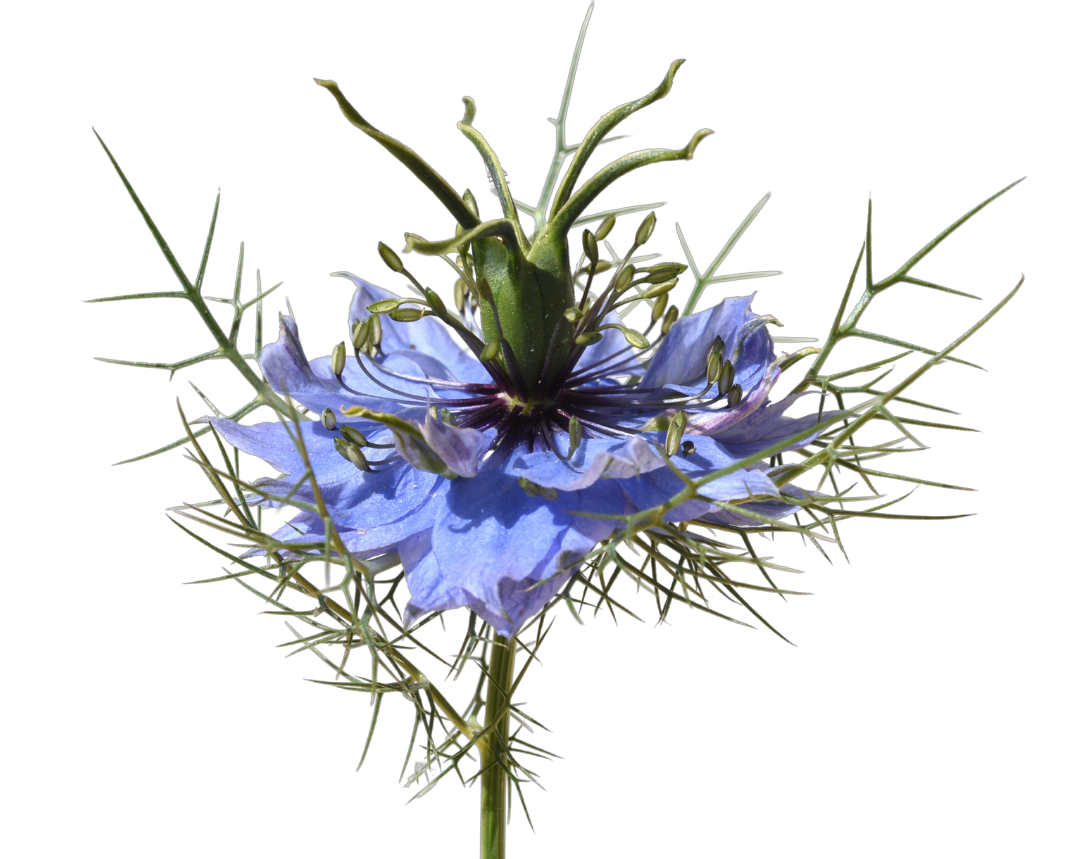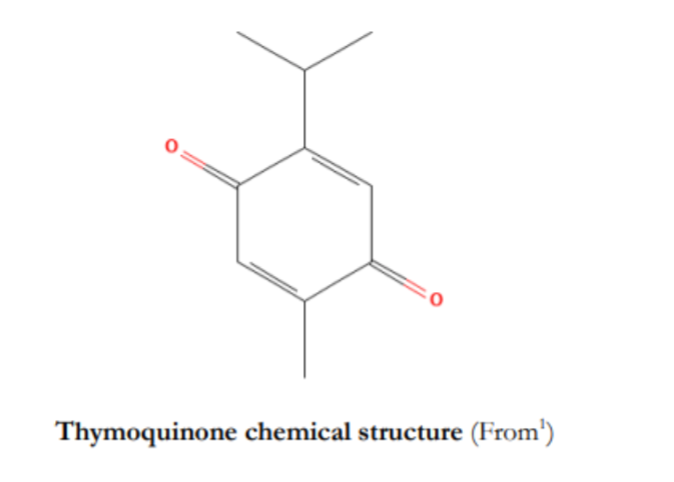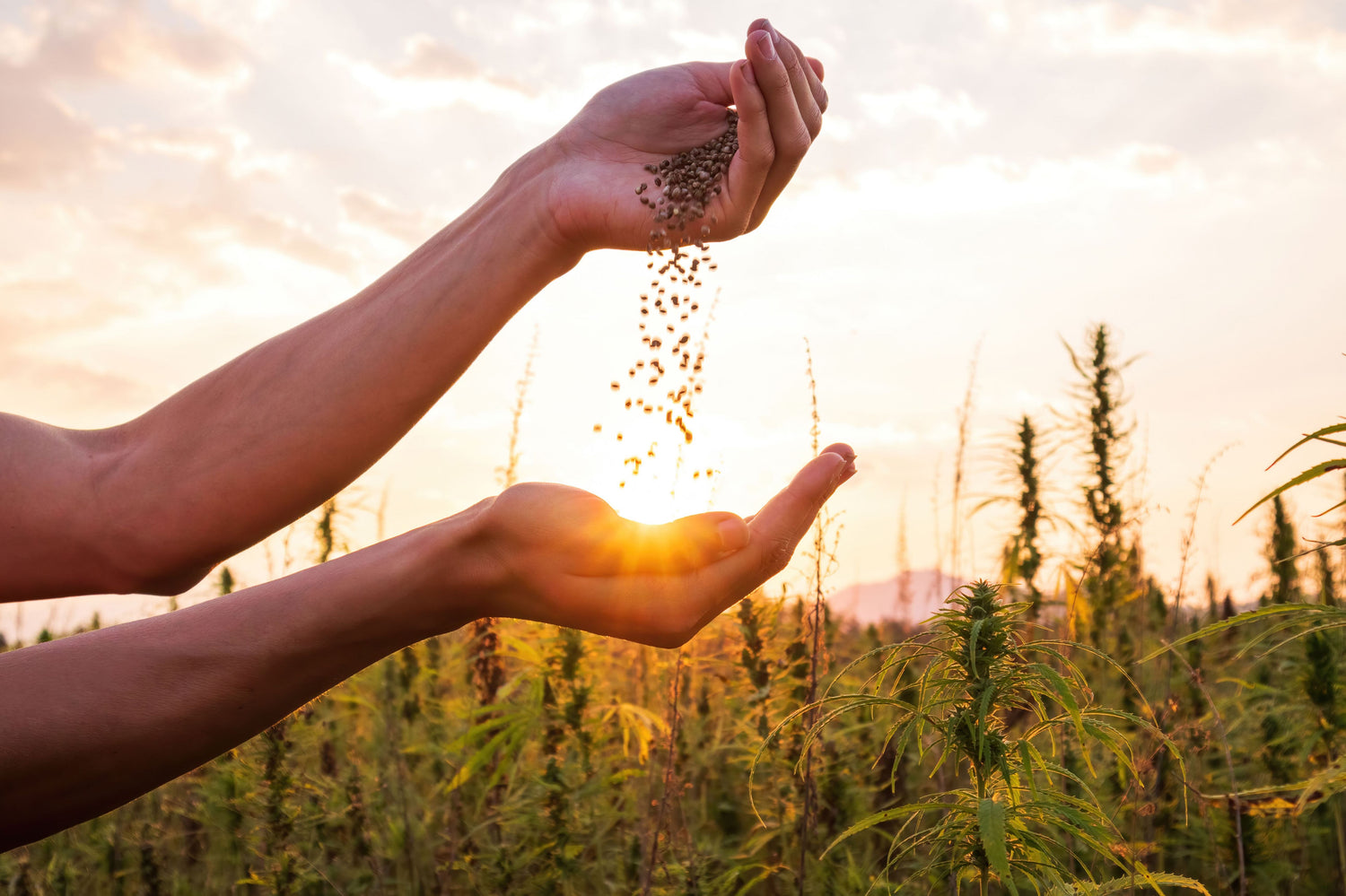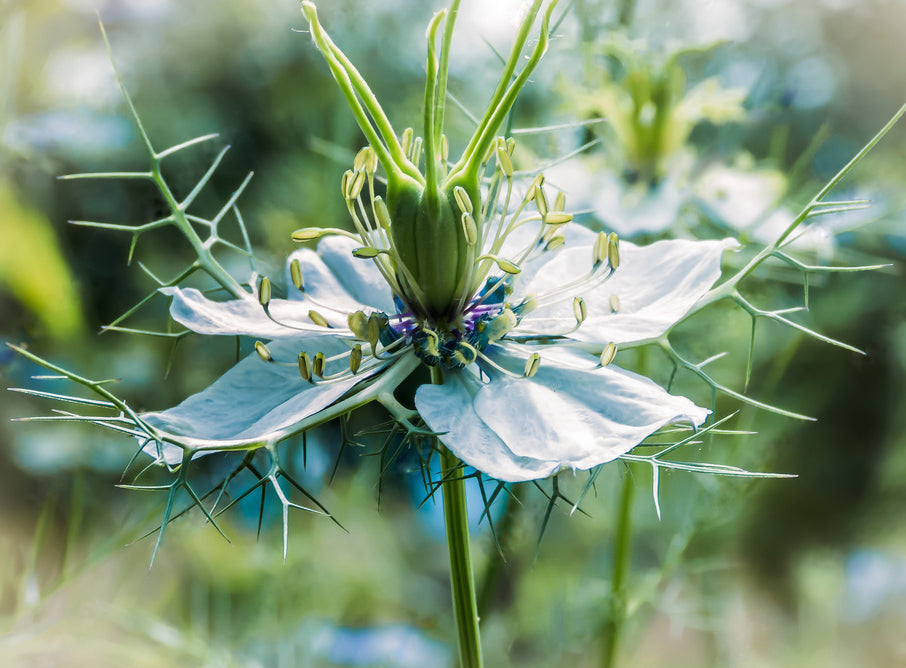
Nature botanique
Nigella sativa appartient à l’embranchement des Spermatophytes, aux sous embranchements des Angiospermes, à la classe des Dicotylédones, à la sous-classe des Magnoliidae, à l’ordre des Ranunculales, à la famille des Ranunculaceae et au genre Nigella.
La famille des Ranunculaceae est une famille ancienne de plantes regroupant environ 2000 espèces distinctes, dont l’une s’est révélée être d’un intérêt thérapeutique à haut potentiel : Nigella Sativa.
Cette plante herbacée annuelle possède quelques caractéristiques uniques : des feuilles basales et caulinaires dites ‘multifides’ c’est-à-dire partagé en nombreuses lanières courtes. Les fleurs en étoiles régulières ont une particularité : leurs parties voyantes et colorées sont constituées par des sépales et les pétales qui contiennent le nectar ont la forme de petits cornets ventrus beaucoup plus courts. Les étamines sont nombreuses, insérées en spirale et entourent cinq longs pistils.
La nigelle est de couleur blanche, bleu clair, bleu foncé voire violet selon les espèces.
Le fruit en forme d’une capsule, contiennent les graines de forme triangulaire noircissant à l’air. Elle peut atteindre jusqu’à 60 cm de hauteur.
La maturation des graines débute en juin pour une récolte d’août à septembre.
Elle est principalement cultivée dans les régions méditerranéennes (Maghreb, Turquie et Syrie), en Asie occidentale jusqu'au Pakistan et en Inde, en passant par l'Arabie saoudite, le Soudan et l’Éthiopie.
La Nigella sativa se distingue de la Nigelle de Damas, retrouvée dans les jardins, par l'absence de feuilles multifides réunies en involucre immédiatement autour de la fleur puis du fruit.

Histoire et usage traditionnel
Des fossiles du début du Crétacé (-250 millions d’années) prouvent l’existence des nigelles à la fin de l’ère secondaire. Ses vertus thérapeutiques et condimentaires sont connues depuis l’Antiquité. Sa première utilisation traditionnelle a été découverte dans l'ancienne ville sumérienne mésopotamienne de Nippur, où elle a été sculptée sur une tablette d'argile estimée à plus de 5000 ans.
Elle était également très plébiscitée dans l'Egypte ancienne, où elle était initialement utilisée comme plante médicinale contre la toux et les maladies pulmonaires, mais aussi comme cosmétique pour la peau. De fait, ses propriétés ont été exploitée par les reines Cléopâtre et Néfertiti grâce aux écrits sur papyrus rédigés à cette époque. Les archéologues ont également découvert des fioles d’huile de cumin noir dans le tombeau du Pharaon Toutankhamon.
Au 1er siècle, Dioscoride, médecin grec, cite les usages de la nigelle : elle sert à soigner les maux de tête, la congestion nasale, les rages de dents et lutte contre les vers intestinaux. Elle était aussi utilisée comme diurétique et favorisait les menstruations et la montée de lait. Dans
la médecine gréco-romaine, on y retrouve également Hippocrate et Galien, qui évoque la nigelle comme efficace contre les ulcères et diverses douleurs, contre les maladies pulmonaires et comme une solution pour favoriser la digestion.
Elle fait partie des plantes dont la culture est recommandée dans les domaines royaux par Charlemagne dans le capitulaire de Villis.
Jusqu’au XVIe siècle, en Europe, ses graines très parfumées étaient fréquemment employées en cuisine pour leur goût piquant comme succédané du poivre.
En Orient, elle est souvent utilisée dans la préparation de pains ou de gâteaux sous forme de graines

Composition chimique
La graine donne une huile fixe, par pression à froid ou au travers d’autres techniques innovantes. La teneur en huile est de 35,6 % à 41,6 %.
La composition en acides gras est assez homogène. Ce sont des acides gras principalement polyinsaturés (55-60 % : acide linoléique majoritaire) et mono-insaturés (20-25 % : acide oléique majoritaire). La proportion des acides gras saturés est de 15-20 % (acides palmitique et stéarique, principalement).
La fraction insaponifiable de l’huile fixe de nigelle est constituée majoritairement de stérols (environ 2,9 g/kg en moyenne) avec principalement les composés usuels suivants : β-sitostérol (environ 50 %), stigmastérol, campestérol.
Des stérols minoritaires sont présents (Δ5-avenastérol, Δ7-stigmastérol, Δ7-avenastérol).
L’insaponifiable contient également de la vitamine E, des caroténoïdes, de la nigellone, et des traces d’alcaloïdes. On retrouve aussi des constituants de l’huile essentielle (H.E.), dont la teneur est assujettie aux conditions de production et de conservation, en plus de la variabilité du matériel végétal (pour mémoire, les constituants d’H.E. ont par définition un caractère volatile). On retrouve en particulier la Thymoquinone (TQ), le bioactif majoritaire qui nous intéressera plus particulièrement. Celui-ci n’est malheureusement que très faiblement quantifié dans les huiles de Nigelle présente ce jour sur le marché du complément alimentaire et de la cosmétique avec des teneurs très variables allant de 0.07% à 1.88%.
La graine contient des alcaloïdes en faible quantité notamment la Nigellicimine, La Nigellimine, La Nigellimine N-oxyde, La Nigellidine et nigellione et des Flavonoïdes dont la quercétine et la kaempférol. Plusieurs saponosides à génines triterpéniques pentacycliques sont présents, dont l’α-hédérine.
Les activités biologiques de la nigelle ne sont pas reliées à ces composés peu abondants, néanmoins leur contribution à des activités antimicrobiennes d’extraits de graines est cependant évoquée.
Enfin, on y retrouve des protéines de l’ordre de 16 à 19%, des fibres insolubles de 5.5 à 8.9%, et des minéraux principalement : Calcium, Cuivre, Potassium, Zinc et Phosphore.

Thymoquinone
La Thymoquinone (nom IUPAC36) est le principe actif principal des graines.
Il s’agit d’un composé du groupe des monoterpènes, appartenant à la classe des benzoquinones. Elle est peu répandue dans le vivant. On la retrouve essentiellement dans les graines de Nigella Sativa.
C'est l'actif le plus puissant étudié cliniquement depuis 1975 et possède à ce jour de nombreux effets bénéfiques pour la santé de l’Homme : antioxydants, anti-inflammatoires, immunomodulateurs, neuroprotecteurs, antiallergiques, anti-hépatotoxiques et antidiabétiques, analgésique, antiprolifératif et antibactérien.
A ce jour, la teneur en Thymoquinone ne dépasse pas les 3% dans les formulations de compléments alimentaires et de cosmétiques, et donc encore moins des graines sur le marché de la supplémentation.
L’enjeu de développer des formules riches en Thymoquinone est donc la mission que s’est donner l’Officine du Monde dans un enjeu d’efficacité, de traçabilité et de Nigelle de qualité.



